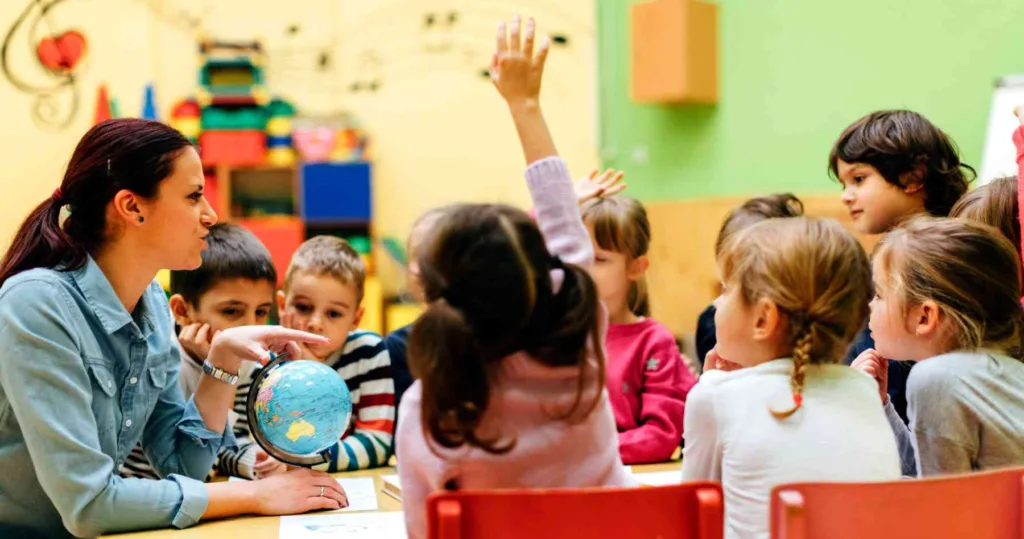The Social Benefits of Preschool: How Early Education Sets Children Up for Lifelong Success
Preschool education is a crucial stage in children’s development, providing them with an opportunity to learn and develop skills that are essential for their success in life. In addition to cognitive development, preschool education plays a crucial role in promoting social skills, which are crucial for building strong relationships and navigating the complex social world. This article explores the social benefits of preschool education and how early education sets children up for lifelong success.






Early Education and Social Skills Development
Preschool education offers an environment where children can learn and develop social skills in a structured and supportive setting. Children learn to interact with others, communicate their needs, and form friendships that can last a lifetime. These skills are essential for building a foundation for social competence and resilience, which can support children’s success later in life.
Empathy: The Foundation of Social Competence
Empathy is a vital social skill that preschool education can help children develop. In preschool, children learn to recognize and understand the feelings of others, which promotes emotional intelligence and social competence. They learn to show compassion and kindness, which are essential qualities for building strong relationships and fostering positive interactions.
Cooperation:
Learning to Work Together Cooperation is another vital social skill that preschool education can help children develop. In preschool, children learn to work together in a group setting, share resources, and take turns, which promotes collaboration and teamwork. These skills are essential for success in school and in life, where individuals must work together to achieve common goals.
Conflict Resolution:
Managing Differences Peacefully In preschool, children learn to manage conflicts in a peaceful and constructive way. They learn to communicate their feelings and needs, listen to others’ perspectives, and negotiate solutions. These skills promote positive conflict resolution and help children develop healthy ways of dealing with differences, which can help them navigate social situations throughout their lives.
Get In touch
Leave us a message
4 Claret Road, Table View, 7441
(021) 556 4146
office@applebeekids.com
Promoting Inclusivity and Respect for Others through Diverse Experiences
Preschool education can also expose children to diverse cultures, traditions, and experiences. This exposure promotes inclusivity and respect for others, which are essential for building a sense of community and promoting a positive social climate. Children who attend preschool with diverse classmates are better equipped to navigate a diverse world and appreciate different perspectives.
The Long-term Benefits of Preschool for Social Development In conclusion, preschool education offers numerous social benefits for children, including the development of empathy, cooperation, conflict resolution, and inclusivity. These skills provide a strong foundation for social competence and resilience, which can support children’s success later in life. Parents and caregivers can support social development by choosing high-quality preschool programs that emphasize social-emotional learning and encourage diverse experiences. Overall, preschool education plays a crucial role in promoting children’s social development and setting them up for lifelong success.

ExcellentBased on 28 reviews
 Pieter Kotze2022-03-11Great pre-primary school in Table View, it has been there for many years and we are now on the verge of sending the 2nd generation there and although they have been around for years, the staff are current and up to date with the latest in childcare and early childhood education, peace of mind for sure...
Pieter Kotze2022-03-11Great pre-primary school in Table View, it has been there for many years and we are now on the verge of sending the 2nd generation there and although they have been around for years, the staff are current and up to date with the latest in childcare and early childhood education, peace of mind for sure... Gareth Bolt2021-08-20Jackie,Maude and Applebee team look after our little boy so wonderfully!
Gareth Bolt2021-08-20Jackie,Maude and Applebee team look after our little boy so wonderfully! Shakurah Hackley2021-08-20My son loves his teachers. They care for our kids and go the extra mile.
Shakurah Hackley2021-08-20My son loves his teachers. They care for our kids and go the extra mile. Nolu Mandindi2021-08-19My daughter been a student since 2019, her brother joined her in 2021, we couldn't be happier with the professionalism shown by the staff. The constant feedback from teachers on progress is on point.
Nolu Mandindi2021-08-19My daughter been a student since 2019, her brother joined her in 2021, we couldn't be happier with the professionalism shown by the staff. The constant feedback from teachers on progress is on point.
Small group activities
Small group activities are an essential part of preschool education that promotes social skills and emotional development. These activities encourage children to work collaboratively, share ideas, and communicate with their peers. Small group activities can include games, puzzles, arts and crafts, or pretend play. They provide children with a chance to practice skills like taking turns, listening to others, and problem-solving, which are crucial for building strong relationships and promoting positive social interactions. Small group activities also help teachers to provide individualized attention to each child, as they can observe and assess each child’s skills and progress. Overall, small group activities in preschool education play a crucial role in promoting social skills development and setting children up for lifelong success.
Social development
Social development is a critical aspect of preschool education that prepares children for social interactions and relationships throughout their lives. Preschool education provides children with opportunities to develop social skills like empathy, cooperation, and conflict resolution through various activities such as playing with others, taking turns, and sharing resources. Through interactions with their peers and teachers, children learn to recognize and understand others’ feelings, perspectives, and needs. They also learn to communicate effectively and appropriately, which is essential for building strong relationships and navigating complex social situations.
Preschool education also promotes social development by providing children with opportunities to interact with diverse cultures, traditions, and experiences. This exposure helps children develop a sense of inclusivity and respect for others, which is crucial for building a sense of community and promoting a positive social climate. Preschool education also supports parents and caregivers by providing resources, information, and guidance on how to promote social development at home.
Overall, preschool education plays a vital role in promoting social development, which sets children up for success throughout their lives. Children who receive a strong foundation in social development in preschool are more likely to form healthy relationships, succeed academically and professionally, and navigate complex social situations effectively.
